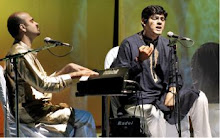
Rock pianists and world change
Saturday May 31 2008 19:19 IST
Anil Srinivasan
We will need to believe in our music, enjoy and engage in its splendours before we are well equipped to have our way with humanity’s ears
As a student of social psychology, I have had the privilege of attending lectures by the famous Tory Higgins. In his first lecture, he taught us how a theory can be attacked. At the outset, he said, one has to believe the theory and hold it close to one’s heart. Only when the theory sounds utterly convincing and absolutely impossible to defeat, he added, does the situation prove conducive to rip it apart completely. He finished that particular argument by adding that disemboweling a theory requires utter faith and belief in it in the first place. He illustrated his point by discussing a friend of his who studied in a seminary school for years before declaring himself an atheist.
This is a powerful thought and it helps in my approach to composition and pedagogy within classical music. To understand classicism, and more importantly, to work ‘around’ the classical idiom requires the greatest belief in its principles and a profound reverence for its tenets. Once drenched, it becomes easier to collaborate with artists from other idioms and figure out excursions outside established norms.
Recently, I heard a transformative piece of work on a friend’s stereo. The artist was Maksim, an internationally renowned ‘rock’ pianist. While this may sound like a contrary juxtaposition of words, the music of this Croatian sensation seems to traverse genres as smoothly as my friend’s car along a traffic-free expressway. The composition is the well-known Flight of the Bumblebee by Rimsky Korsakov, except that this particular rendition does not seem like the original. Here is a pianist trained at the best conservatories in Europe, winner of several classical piano competitions and perhaps one of the fastest movers on a keyboard (yes, he is faster than Adnan Sami!). And unlike the many classical pianists I have encountered in New York cafes and music circuits, I see absolutely no listlessness or stuffy resignation in either Maksim’s personality or his style of playing. This is a pianist who dresses and looks like a rock star, takes classical compositions out of their original shells and sculpts them into power-packed, faster-paced bubbles of locomotive energy. Suddenly, a Brahms intermezzo is making me want to hit the dance floor, an idea that is not really as absurd as it sounds!
World over, the tastes of the youth are described as mercurial and rebellious. Maksim has hit that particular vibration with calculated precision. The same lips that spouted Jay Z, Bjork or DMX are suddenly discussing Brahms and Chopin. It has taken Maksim years of ‘believing’ in the classical idiom to turn rebel, uproot the classical repertory from its foundations and turn it on its head. The result is music that is irresistible.
This article is certainly not meant as a campaign for free experimentation. On the contrary, I wonder if musicians and audiences, especially those who favour ‘fusion’ have taken the time to believe in the original idiom of their choice completely, be it classical or otherwise. Has there been an attempt to penetrate to the very soul of their respective tradition before the experimentation has begun? If they did so, I believe that entirely new genres can emerge, captivate audiences and even draw them towards music that are otherwise difficult to relate to (like in Maksim’s case). “Rock Piano” can be as exhilarating as “Jazz Violin” or even “Classical Bebop”, provided that their respective proponents have been arduous students who managed to get their homework right. True musicians have been endowed with a gift truly beyond the ordinary. This gift, however, comes with a serious responsibility of taking the existing musical lexicon and enlarging it meaningfully.
I often hear friends and music lovers complain of a dearth of ‘really good new music’ or even of the low quality of the current ‘fusion’ artists. If this is really true, I suppose we are facing a sad situation. I choose to believe in the contrary, simply because I believe that our generation has the capacity for immense creativity. And by that, I mean that we have the capacity to ‘create’ new genres, and not merely experiment with the old ones. We can produce output that is truly new, adding to the world's output of music and taking the boundaries forward, just as we continue to achieve all this in medicine or science.
However, we must first ‘believe’ in the existing repository of music and regale in its splendours. Thus equipped, I do not think there is anything stopping us from changing what the world is listening to!
Anil Srinivasan
Copyright New Indian Express


5 comments:
rThe post reminds me of Eliot's discussion on writing new poetry in his essay "tradition and individual talent" . Thought provoking post Mr.Pianist :-)
Angelofdusk...thanks a lot for your comments. How is life in Bangalore these days? :)
anil anil.... the repetitive use of one's name made famous by a VM educated prof at Leigh Univ is very much in vogue :)) Considering the widespread use of it you must see if u can follow the style and say erudite things like pianists pianists.. and the like. In any case, first time visit to the blog and is a great read after lunch at work! I think he theory of know it well before u reject is awesome and has been written very well.
my dearest lawyer amma...thanks for the post :)
How come everything flows so very smoothly 'out of you?'
My highest honour for you sir!
:)
Post a Comment